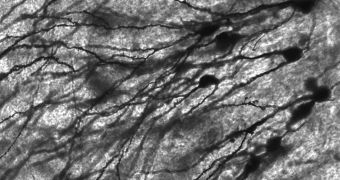Scientists have discovered that the hormone estrogen may be linked to an increased number of synapses that develop between nerve cells in the brain called neurons. This means that the chemical may be directly linked to an increase in mental performances.
As a direct result, elevated concentrations of the stuff in the brain can lead to improved communications between nerve cells. This discovery could lead to new therapies for disorder such as schizophrenia and Alzheimer's disease.
Experts now believe that mimicking the effects of this hormone on the brain may provide a way to address this conditions. Using the chemical itself may cause hormonal imbalances in the body.
In past studies, it has been demonstrated that administering estrogen to both lab animals and humans increased their test accuracy, as well as their memories. The new work built up on these findings.
Details of the investigation were made public on November 17, at the meeting of the Society of Neuroscience, which was held in San Diego, California, My Health News Daily reports.
Using rat neurons grown in a lab dish, researchers at the Northwestern University Feinberg School of Medicine tested the effects of various compounds on the cells. All the chemicals were engineered to mimic the effects of estrogen.
What these substances did was activate the estrogen receptors on the nerve cells. This process triggered a reaction chain inside the cells, that eventually lead to an increase number of dendritic spines on the neurons.
These spines play an important role in neural communications. The hair-like protrusions connect to similar structures produced by other nerve cells, allowing the cells to exchange electrical signals.
“What this told us is that if you specifically activated the [estrogen receptor] you can potentially increase the amount of information that could go from one cell to another,” says Deepak Srivastava.
The Northwestern investigator was a researcher on the new study. He mentions that applying estrogen therapies has been associate with negative side-effects in women.
In the past, doctors recommended such treatments to alleviate the symptoms associated with menopause, but studies have demonstrated an increased risk of breast cancer, stroke and heart attack.
This is the main reason why researchers want to develop methods of activating estrogen receptors on cells without actually using the hormone.
What is left to be done now is to start clinical trials to determine whether the same effects take place in the living human brain. If that is the case, then new therapies based on estrogen-like substances may be developed.
The new study was funded by the National Institutes of Health (NIH), the American Heart Association and the National Alliance for Research into Schizophrenia and Depression.

 14 DAY TRIAL //
14 DAY TRIAL //